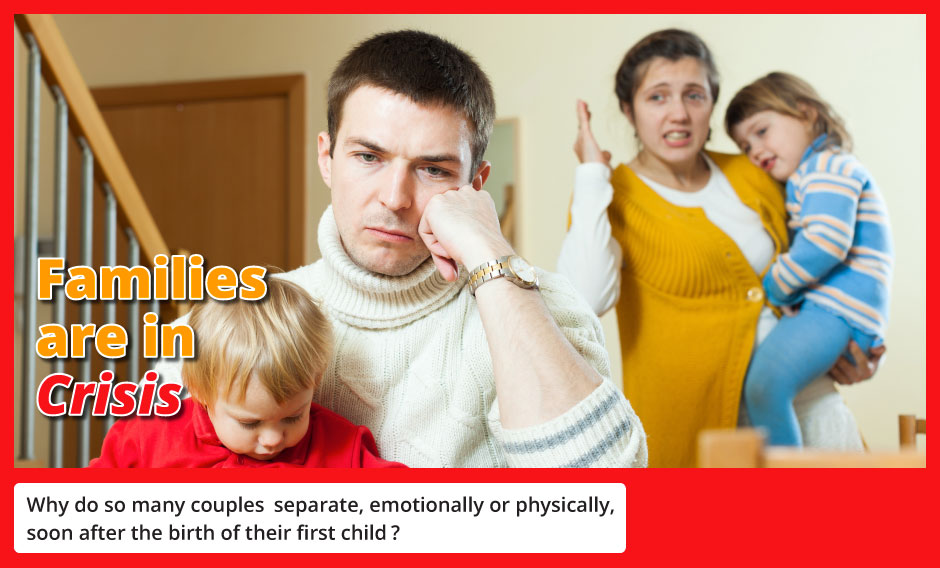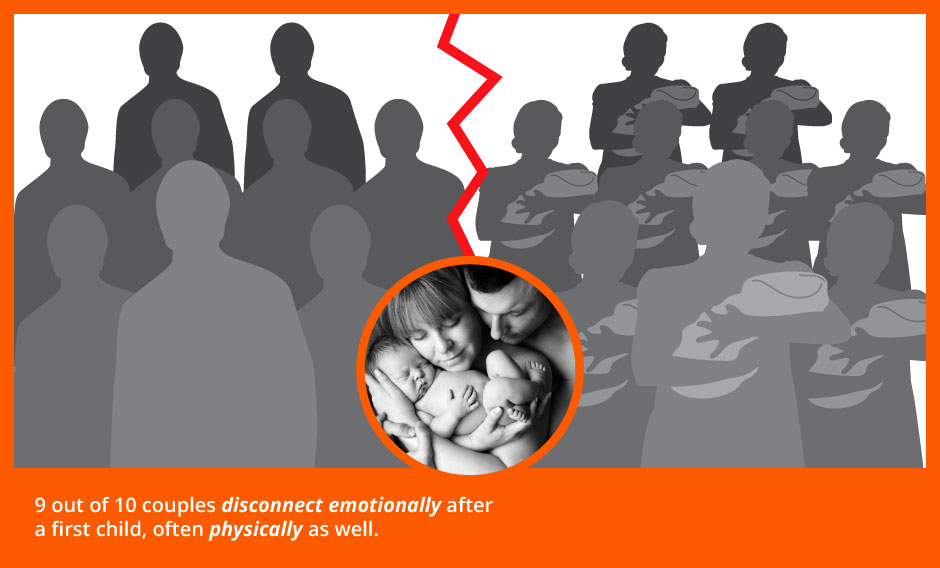The MPAS Crisis
The Crisis at a Glance
Partners face many challenges during pregnancy and after the child is born. This can be an intense time. When a couple isn’t fully supported within an extended family or community, it is difficult (maybe even impossible) to meet everyone’s needs. The nuclear family experiment (only 1 or 2 parents with no adult relatives nearby), is only about 100 years old, and is proving to be a disaster.
It is not optimal for raising children.
Most nuclear families experience massive disconnection due to unmet needs, resulting from too little support. Often (9 times out of 10!) the father leaves emotionally or even physically. A major cause is Male Postpartum Abandonment Syndrome or MPAS, a layered experience of disconnection affecting the whole family. Due to MPAS, we are seeing an epidemic of failed relationships shortly after a child is born.
For families to thrive, we need many people involved with each child, and more support surrounding parents—parents need a community, or a tribe, to create a healthy family. With proper support, a couple can stay connected. This allows them to tend to their individual wellness, including personal growth and/or healing old childhood trauma, which often surfaces in new parents.
For a transformation to community/tribal support, we are all required. Helping professionals working with new parents are the ideal guides to help families open to support and direct them to appropriate resources.
A Destructive Epidemic
Why do so many couples separate—physically or emotionally—soon after the birth of their first child? This silent epidemic of failing partnerships is reaching epic proportions.
Approximately 30% of couples split up within a few years after the birth of their first child. And upwards of 90% separate emotionally, along with a plummeting sexual connection.
Having children seems to destroy marriages,
especially in nuclear families.
The introduction of a baby taxes a nuclear family system (only 1 or 2 parents with no adult relatives nearby) beyond capacity. It’s impossible to meet everyone’s needs with so few people in a household.
The resulting extreme stress leads to further disconnection, and often to separation, divorce, and broken families.
Usually it is the dad who seems to disappear, because the mother stays with the child, usually in the family home. But it’s really the partnership that has disappeared.
The Gottman Institute reports up to two out of three couples are unhappy after baby comes home.
This statistic was recently translated by a Huffington Post writer as tongue-in-cheek advice to “divorce while baby is young”—an all too common trend:
“If you split right after a baby’s born, not only will your baby be too young to hold that against you, or even have memories of it later on, but you were going to be sexually frustrated and emotionally distant in your marriage anyway. Honestly, I just can’t think of a better time—can you?” — Vicki Larson, Huffington Post
How is this kind of positioning of relationship helping families?
What if, instead, you can stay connected (as a couple and as a family) and enjoy the early years of parenting, even thrive?!?! You can!
How MPAS Develops
Because of cumulative unmet needs (see The Roots of Disconnection) many boys grow up looking for a mother-connection they never had. If lucky, the man finds and mates with “Her,” thinking he is now complete and fully connected.
Once the honeymoon has passed, distance grows because our disconnected culture has few resources for maintaining social bonds or developing communication skills—particularly for men. The resulting lack leaves men with inadequate resilience—especially when the arrival of an infant creates massive changes in their primary relationship.
When a man’s first child is born into a nuclear family, “he often feels like he must go out and earn more money to support his wife and her new lover.”1 He can’t consciously admit this, even to himself, but this is how his own little boy often feels inside.
He also craves the attachment he is witnessing between his baby and partner, which he likely didn’t experience himself as an infant. And now he’s saddled with even more responsibility, as well as a loss of the attention he’s used to getting from his partner. This can be a devastating experience for a man at a time when he is expected to be joyful at the arrival of his child.
These losses, stacked upon the unreasonable demands on parents attempting to raise children in a nuclear family, creates a stress that so often leads the decline of the romantic connection. It is made even worse if one or both parents work outside the home.
Breakdown is inevitable. Click HERE to learn more about The ROOTS of Disconnection.

Recreating villages is crucial to solving this systemic cultural breakdown.
Join the Community


1 Warren Farrell, PhD, Personal communication to John Travis







